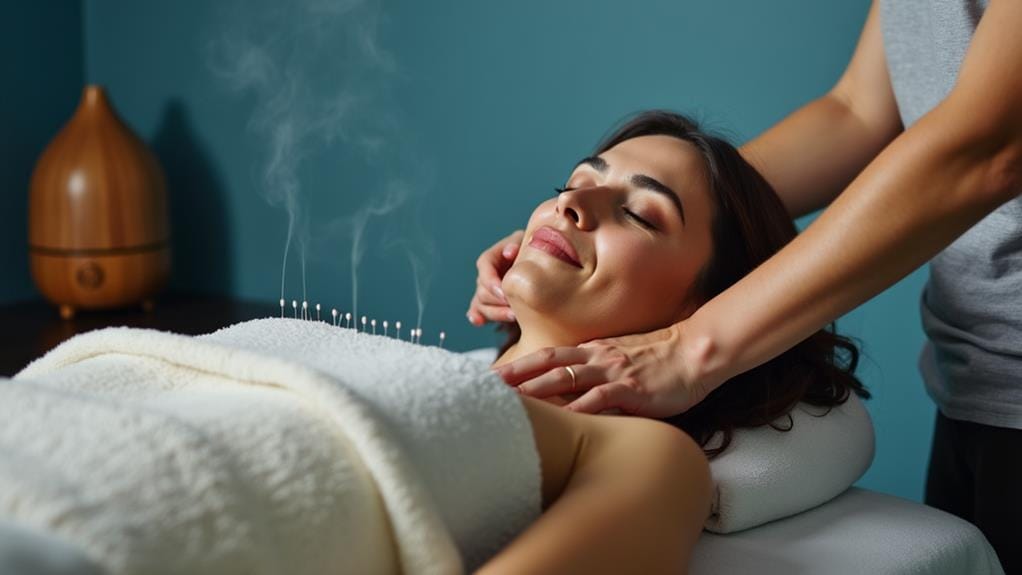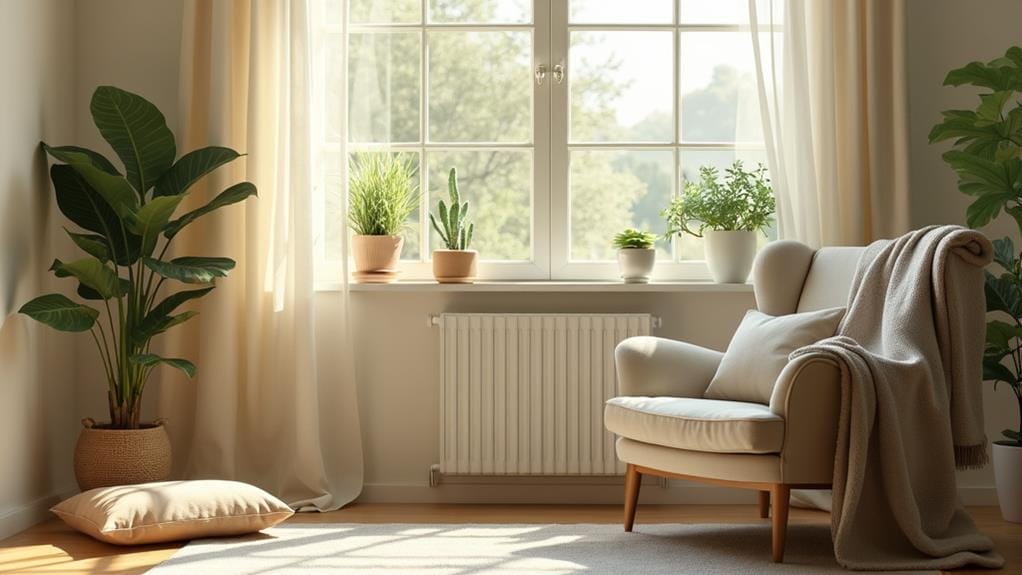Picture yourself standing at the crossroads of midlife, where hormonal shifts and life changes converge like swirling winds. You’re not alone in feeling anxious during this transformative phase. As a woman over 40, you’ve likely encountered new challenges that can stir up worry and unease. But there’s good news: numerous effective strategies exist to calm your mind and restore balance. From lifestyle adjustments to medical interventions, the path to serenity is paved with diverse options. What specific approaches might work best for you? The journey to rediscovering inner peace is just beginning, and the answers may surprise you.
Key Takeaway
- Regular exercise, particularly aerobic activities and weight lifting, significantly reduces anxiety symptoms in menopausal women.
- Mindfulness practices like meditation and yoga decrease stress hormones and alleviate anxiety during menopause.
- Hormone Replacement Therapy, when combined with other treatments, can enhance mood stability and reduce anxiety.
- Cognitive Behavioral Therapy helps restructure negative thought patterns associated with menopausal anxiety.
- Natural supplements like ashwagandha, omega-3 fatty acids, and magnesium may improve mood regulation and anxiety symptoms.
Understanding Menopause-Related Anxiety
As you move into your 40s and beyond, understanding menopause-related anxiety becomes vital for managing your overall well-being. Approximately 50% of women aged 45-65 experience anxiety symptoms during the menopausal shift. These can include a racing heart, excessive worry, and sleep problems, which are often exacerbated by physical symptoms like hot flashes and night sweats.
The root cause of menopause-related anxiety lies in fluctuating hormone levels, particularly estrogen. During perimenopause, these hormonal changes greatly influence brain function and mood regulation, making you more susceptible to anxiety. This is especially true if you have a personal history of anxiety disorders.
It’s important to note that anxiety can occur at any stage of the menopausal shift, emphasizing the need for early recognition and management. You may experience symptoms during perimenopause, menopause itself, or even in the postmenopausal period.
Fortunately, several treatment options are available to help alleviate menopause-related anxiety. Lifestyle changes, such as regular exercise and stress reduction techniques, can be effective. Cognitive behavioral therapy (CBT) is another valuable tool, helping you develop coping strategies for anxiety symptoms. For more severe cases, hormone replacement therapy (HRT) or medications like selective serotonin reuptake inhibitors (SSRIs) may be recommended by your healthcare provider.
Understanding the connection between menopause and anxiety is vital for seeking appropriate treatment. By recognizing the symptoms and their underlying causes, you can take proactive steps to manage your anxiety and improve your quality of life during this shifting period.
Lifestyle Changes for Anxiety Relief
While understanding menopause-related anxiety is important, taking action to alleviate symptoms can markedly improve your quality of life. Implementing lifestyle changes for anxiety relief can effectively address the emotional instability often associated with hormonal changes during menopause.
Regular exercise, particularly aerobic activities, has been shown to considerably reduce anxiety symptoms. Studies indicate that lifting weights twice a week can lead to a 20% improvement in anxiety scores. Additionally, incorporating mindfulness practices like meditation and yoga into your routine can contribute to considerable stress reduction over time. Research demonstrates a 25% decrease in hair cortisol levels after six months of mindfulness training.
Making healthy dietary adjustments is another vital step in managing anxiety. Focus on consuming whole foods rich in fruits and vegetables to enhance your mental well-being during menopause. Proper sleep hygiene is equally important; establish a consistent sleep routine and minimize disturbances to improve emotional stability.
Relaxation techniques can provide immediate relief from anxiety symptoms. Practice deep breathing exercises and consider incorporating herbal teas like chamomile into your daily routine to promote a sense of calm and well-being. These methods can be particularly effective when combined with other lifestyle changes.
Medical Treatments and Therapies

Exploring medical treatments and therapies can provide significant relief for women over 40 experiencing anxiety. For many, antidepressants such as SSRIs (selective serotonin reuptake inhibitors) and SNRIs (serotonin-norepinephrine reuptake inhibitors) are effective options. These medications, including sertraline and venlafaxine, have been shown to alleviate anxiety symptoms in women traversing hormonal changes during menopause. Other effective calming solutions include cognitive-behavioral therapy (CBT) and mindfulness meditation, both of which have been found to reduce anxiety in women over 40. These non-pharmacological approaches can provide long-term relief by equipping women with coping strategies and tools to manage their anxiety symptoms. Overall, a combination of medical treatments and therapies tailored to the individual’s needs can significantly improve the wellbeing of women experiencing anxiety during this stage of life.
Cognitive Behavioral Therapy (CBT) is a first-line therapeutic approach that you should consider. This therapy helps restructure negative thought patterns associated with anxiety, offering long-term benefits. It’s particularly useful for addressing mood changes and anxiety related to fluctuating estrogen levels.
If you’re experiencing both vasomotor symptoms and anxiety, Hormone Replacement Therapy (HRT) may be beneficial. Many women report improved mood stability when using HRT, which can address both physical and emotional symptoms of menopause. Research suggests that combining SSRIs or SNRIs with HRT may enhance treatment outcomes for those experiencing menopausal symptoms alongside anxiety.
It’s essential to consult with mental health professionals, particularly those specializing in menopause-related issues. These experts can tailor a treatment plan to your specific needs, considering factors such as your medical history and the severity of your symptoms. Menopause clinics often provide thorough evaluations and can recommend the most appropriate combination of therapies for your situation.
Natural Remedies and Supplements
Natural remedies and supplements offer alternative approaches for managing anxiety in women over 40. Herbal remedies like ashwagandha and black cohosh have shown potential in alleviating anxiety symptoms and improving stress resilience. However, if you’re on thyroid medication, exercise caution due to possible interactions. It’s vital to consult healthcare professionals before starting any supplements, as individual responses can vary.
Mindfulness practices and relaxation techniques, such as yoga and meditation, can greatly reduce anxiety levels. A study reported a 25% decrease in hair cortisol levels after six months of mindfulness training, indicating improved stress management. These practices can be easily incorporated into your daily routine, providing long-term benefits for mental well-being.
Nutritional adjustments focusing on whole foods and increasing fruit and vegetable intake may help reduce anxiety symptoms. Dietary supplements like omega-3 fatty acids and magnesium have been linked to improved mood regulation, potentially offering additional support for anxiety management. However, it’s important to verify the quality and efficacy of herbal products, as the industry has limited regulation.
When considering natural remedies and supplements, remember that they’re not a one-size-fits-all solution. Your healthcare provider can help you determine which options may be most beneficial for your specific situation. They can also guide you on potential interactions with existing medications and recommend appropriate dosages. By combining these natural approaches with professional medical advice, you can develop a thorough strategy for managing anxiety and improving your overall quality of life after 40.
Building a Supportive Environment

Creating a supportive environment is essential for managing anxiety in women over 40. Open communication with friends, family, and healthcare providers about your anxiety experiences can greatly reduce feelings of isolation and promote understanding. By sharing your concerns, you’ll build a network of empathetic individuals who can offer support and guidance throughout your menopausal journey.
Joining support groups for women experiencing menopause anxiety provides opportunities for shared experiences and practical coping strategies. These groups offer a safe space to discuss challenges and learn from others facing similar issues. Community discussions and online platforms focused on menopause anxiety can enhance awareness and create a sense of belonging among women traversing this life change.
Educational resources, such as articles and workshops addressing menopause-related anxiety, empower you with knowledge and tools to manage your symptoms effectively. By staying informed, you’ll be better equipped to address your concerns and make informed decisions about your health.
| Support Type | Benefits | Examples |
|---|---|---|
| Peer Support | Shared experiences, emotional validation | Support groups, online forums |
| Professional Guidance | Expert advice, tailored strategies | Healthcare providers, therapists |
| Educational Resources | Knowledge empowerment, self-management skills | Workshops, articles, webinars |
Establishing a network of supportive peers and professionals can lead to improved emotional well-being and resilience against anxiety. By actively engaging in community discussions, seeking educational resources, and maintaining open communication with your support system, you’ll create a strong foundation for managing menopause anxiety. Remember, you’re not alone in this journey, and building a supportive environment is essential for your overall well-being during this shifting period.
Frequently Asked Questions
What Is the 3-3-3 Rule for Anxiety?
The 3-3-3 technique is a grounding technique for anxiety. You identify 3 things you see, hear, and touch. It’s a mindfulness meditation that acts as a natural stress reliever, complementing other practices like breathing exercises and journaling.
Why Is My Anxiety Getting Worse in My 40S?
Your anxiety may be worsening due to hormonal changes and life changes. Stress management becomes vital as you face health challenges and shifting relationship dynamics. Societal pressures can also impact your emotional resilience, making self-care practices and mindfulness techniques essential.
What Is a Natural Anxiety Pill?
Ironically, you’re seeking a “pill” when nature’s anxiety relief isn’t so simple. Natural remedies include herbal supplements, lifestyle changes, mindfulness techniques, diet adjustments, exercise routines, breathing exercises, sleep hygiene, social support, and stress management. They’re not magic, but they’re effective.
How to Remove Anxiety Naturally?
You can naturally reduce anxiety through mindfulness practices, breathing exercises, and physical activities. Try herbal remedies, make dietary changes, improve sleep hygiene, seek social support, journal, meditate, and use relaxation methods to manage your symptoms effectively.
Conclusion
As you navigate anxiety after 40, remember that a thorough approach is key. By combining lifestyle changes, medical treatments, and support systems, you’re taking essential steps towards relief. Notably, studies show that up to 23% of women experience increased anxiety during perimenopause. However, with the right strategies, you can effectively manage these symptoms. Embrace this journey of self-care and don’t hesitate to seek professional help when needed. Your well-being is paramount, and relief is within reach.




